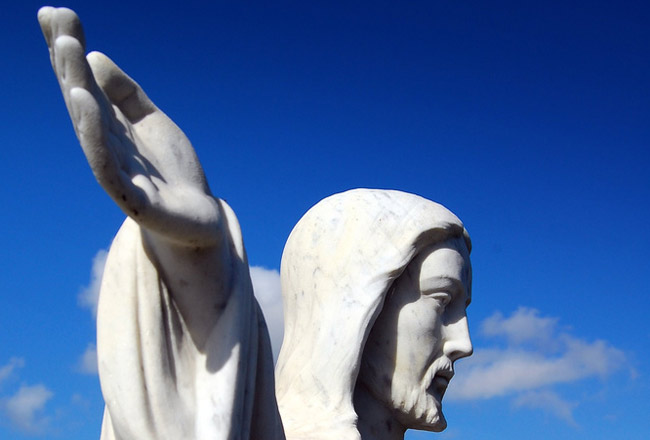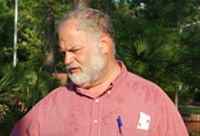
Circuit Judge Terry Lewis on Wednesday struck down part of a proposed amendment that would allow taxpayer money to go toward religious institutions, calling the language of the ballot summary ambiguous.
The suit was filed by Palm Coast Rabbi Merrill Shapiro, who is president of the national board of Trustees of Americans United for Separation of Church and State, by the Florida Education Association and other public education groups. Shapiro called the ruling a “mixed blessing.”
“Hopefully this will keep the issue off of the November 2012 ballot,” Shapiro said. “It will give everyone some time to reconsider this notion that rather than individual citizens deciding what religious institutions and schools to support, the government will do it for us.”
But backers of the measure, referred to as Amendment 7, called the ruling a minor and easily fixable setback that could be remedied in time for voters to still have a chance to address the issue in November.
In a 12-page ruling (see the full text below), Lewis said the language that voters would read in the summary of Amendment 7, passed by lawmakers earlier this year to be placed on the November 2012 ballot, was misleading, giving voters the impression that passing it would conform the state constitution to the First Amendment protections outlined in the U.S. Constitution.
In fact, Lewis said the proposal, if approved by voters, would set standards more restrictive than the U.S. Constitution.
But Lewis went on to reject two other arguments in the suit. Lewis said the ballot title “Religious Freedom” was not misleading and also upheld a recently enacted law that will allow the attorney general to rewrite the ballot summary to make it more clear.
“To quote Meatloaf, Two out of three ain’t bad,” said Rep. Scott Plakon, R-Longwood, House sponsor of the bill.

It is sometimes referred to as the “Blaine Amendment,” for James G. Blaine, a 19th Century congressman from Maine who lobbied unsuccessfully to get that restriction inserted into the U.S. Constitution. After it failed, 37 states, including Florida, put similar provisions in their own state constitutions.
“The goal of Ballot Amendment 7 is to do away with our state’s ‘No-Aid’ provision and allow the government to decide what religious denominations, what churches, what sects should be supported with our tax dollars,” Shapiro said. “This seems to me a case where the state government of Florida will be using its powers of taxation to extract from Floridians monies to support religious activities. This when our public school teachers are so underpaid, our officers of the law, firefighters, first responders are going without cost-of –living increases, and here we are going to find money to fund religious institutions. It just doesn’t make sense.”
Wednesday’s ruling was a partial victory for the FEA. The teachers union had argued the proposal would sap needy funding from public schools by diverting the funds to private and religious-based institutions.
“We applaud the judge’s decision. Amendment 7 would have required taxpayers to fund a broad array of religious programs and institutions,” said FEA President Andy Ford, in a statement. “The judge agreed that taxpayers and voters need to be told the truth and that the purpose and effect of the amendment was not clear in the ballot summary and was misleading to voters.”
Following the ruling, Plakon said he was encouraged that Lewis had sided with lawmakers on the other two points. The judge went so far as to propose language that would clear up any ambiguity in the proposal.
“The good news is that it looks like voters will be allowed to weigh in on this religious freedom issue in November, ” Plakon said.
Plakon is usually an advocate of limited government. Shapiro seized on the irony surrounding the initiative’s backers, calling their effort “another case of ‘big government.’”
“Our legislators,” Shapiro continued, “whom the judge feels have used ambiguous and misleading language to try and get us to vote with them on this issue, want to enlarge government and send tax money to programs that are not currently funded because of Article 3 of our State Constitution.”
–FlaglerLive and the News Service of Florida
Disclosure: Merrill Shapiro chairs FlaglerLive’s advisory board.
![]()
Summary judgement on Florida’s proposed Constitutional Amendment 7





























Jack Howell says
Merrill Shapiro is doing the right thing. Great work!
George Klaes says
Rabbi Merril Shapiro looks very odd helping the NEA/FLE, ACLU, AU, and KKK coalition that favors a ban on aid to Jewish schools and Catholic schools.
NortonSmitty says
All of our “Conservative” readers and Tea People are probably wondering what our Founding Fathers would have to say about this. Let’s check with Mr. Jefferson:
“”Shake off all the fears of servile prejudices, under which weak minds are servilely crouched. Fix reason firmly in her seat, and call on her tribunal for every fact, every opinion. Question with boldness even the existence of a God; because, if there be one, he must more approve of the homage of reason than that of blindfolded fear. ” Thomas Jefferson
“Believing with you that religion is a matter which lies solely between man and his God, that he owes account to none other for his faith or his worship, that the legislative powers of government reach actions only, and not opinions, I contemplate with sovereign reverence that act of the whole American people which declared that their legislature should ‘make no law respecting an establishment of religion, or prohibiting the free exercise thereof,’ thus building a wall of separation between church and State.” Thomas Jefferson
“To talk of immaterial existences is to talk of nothings. To say that the human soul, angels, god, are immaterial, is to say they are nothings, or that there is no god, no angels, no soul. I cannot reason otherwise: but I believe I am supported in my creed of materialism by Locke, Tracy, and Stewart. At what age of the Christian church this heresy of immaterialism, this masked atheism, crept in, I do not know. But heresy it certainly is.” Thomas Jefferson
I think he might be on the fence on this one.
George Klaes says
Jefferson was an extreme majoritarian, Jefferson was not a member of the Congress that created the Bill of Rights, Jefferson was not in the country when the Constitution was written, Jefferson opposed ratification of the Constitution, and fortunately, Jefferson’s extreme views were rejected by the majority.
Jefferson’s interpretation is irrelevant and from the 1790’s to 1947, no Justice of the Supreme Court included in a majority opinion of the court, Jefferson’s “Wall of Separation” extreme misinterpretation of the establishment clause.
In 1907, Florida voters rejected an attempt by William N. Sheats and friends to pass a law prohibitting the Catholic schools from receiving their share of the education taxes. It was during the anti-Catholic period that followed that such restrictions were approved in the State education policies.
William Nicholas Sheats: Florida Superintedent of Public Instruction 1893-1905 and 1913-1922.
Segregationist, firmly supported “Separate but Equal” policy. William Nicholas Sheats was also
known for anti-Catholic prejudices.
JR says
Jefferson’s oft misapplied “wall,” (even by the Supreme Court) is a direct response to a letter from the Baptist Association of Danbury, Connecticut. In their letter the association had written of their fear that the wording of the the First Amendment meant that religious freedom was government-given, not God-given (or inalienable), and thus a right that the government could take away. They went so far as to suggest that their religious freedom was a viewed as a favor by the government — to be taken away at any provocation. Jefferson’s response was to quell these fears. And, while he did never call for a day of prayer, fasting and thanksgiving as president — he did as governor of Virginia; as per his interpretation of the 10th Amendment, religious matters were a right that was given to the states.
George Klaes says
At the time of the ratification of the United States Constitution, 10 of the 13 states had established religions.
Joe A. says
Interesting enough it should be noted that no where in the constitution does it specify “a separation of church and state”. The framers wrote that government will not endorse or prohibit the exercise of free religion.
Liana G says
Is there anything in the constitution about paying taxes? Sorry, I am not au fait on the interpretations of the constitution. Forcing an individual to pay taxes and then denying them choices on how to spend their tax dollars is not very democratic though, is it?
Anonymous says
This is NOT a ‘bill” that is meant to give tax dollars to a house of worship for it use in its day to day business. It is a “bill” that is meant to give a house of worship tax dollars for “public” services like soup kitchens aid to the homeless and yes even schooling. None of them is the sole duty of Government. Why not give some of this money that already is in budgets to other places then Government to do this work? just consider that they may be able to get the money or help to those who realy need it in the most cost effective way.